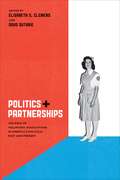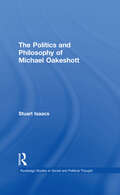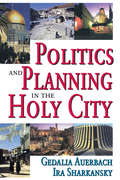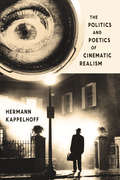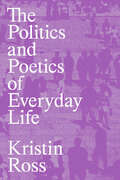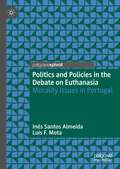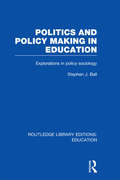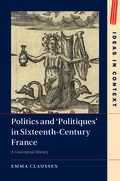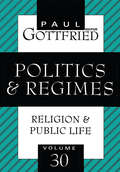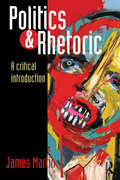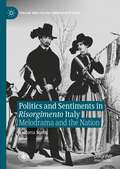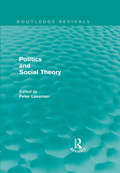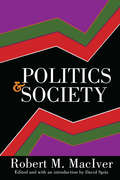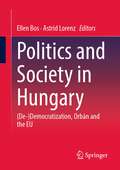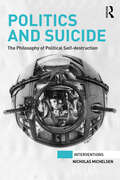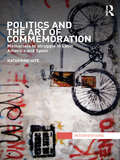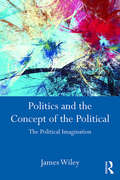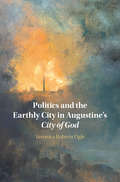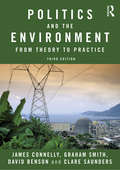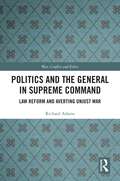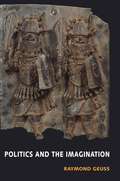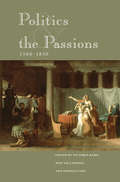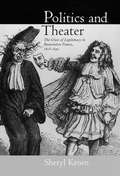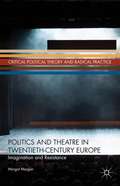- Table View
- List View
Politics and Partnerships: The Role of Voluntary Associations in America's Political Past and Present
by Elisabeth S. Clemens Doug GuthrieExhorting people to volunteer is part of the everyday vocabulary of American politics. Routinely, members of both major parties call for partnerships between government and nonprofit organizations. These entreaties increase dramatically during times of crisis, and the voluntary efforts of ordinary citizens are now seen as a necessary supplement to government intervention. But despite the ubiquity of the idea of volunteerism in public policy debates, analysis of its role in American governance has been fragmented. Bringing together a diverse set of disciplinary approaches, Politics and Partnerships is a thorough examination of the place of voluntary associations in political history and an astute investigation into contemporary experiments in reshaping that role. The essays here reveal the key role nonprofits have played in the evolution of both the workplace and welfare and illuminate the way that government’s retreat from welfare has radically altered the relationship between nonprofits and corporations.
The Politics and Philosophy of Michael Oakeshott (Routledge Studies in Social and Political Thought)
by Stuart IsaacsMichael Oakeshott was a leading Political theorist described by The Telegraph in 1990 as "the greatest political philosopher in the Anglo-Saxon tradition since Mill – or even Burke". There has been sustained interest in his work, and a developing body of literature, over recent years. This book offers a clearly written and accessible critical analysis: it presents complex theories and concepts in a way that will introduce new readers to Oakeshott’s work, and at the same time offers a fresh approach for those already familiar with his philosophy. The Politics and Philosophy of Michael Oakeshott reveals how his work relates to contemporary political philosophy (for example, Arendt, Rorty, Rawls); and moreover, how it links to broader debates within philosophy and the social sciences and, building upon the work of Devigne, through to postmodernism. This book brings together the disparate influences that have, at various times, been associated with Oakeshott’s work, and draws from a number of essays which have been published posthumously. Referring to these, and other more well-known texts, the author makes sense of the many dimensions of Oakeshott’s work by placing a moral concern as central to his system of thought. All in all this book considers the recently published ‘lesser-known’ essays as well as the latest secondary appraisals of Oakeshott’s work, which sets his thought in the contemporary political environment of the twenty-first century. This much-needed text with be of great interest to students and researchers in political science and philosophy.
Politics and Planning in the Holy City
by Gedalia Auerbach Ira SharkanskyJerusalem is not just another city that illustrates the conflict between interests of professional planners and competing political perspectives. It is the Holy City, with a history of some 3,000 years. Moreover, numerous layers of historical remains have importance for intense and competitive religious and national interests. Israelis claim it as the capital of their country, and Palestinians want it--or part of it--as the capital of their not yet created state.Jerusalem is also a place where more than 700,000 people live, and the center of a metropolitan area with more than twice that number. Along with religious and national interests, there are the customary conflicts between what various groups--property developers, politicians, professional planners, neighborhood residents, and environmental activists--want to do with the land. Politics and Planning in the Holy City describes and analyzes the tensions between politics and planning.The authors tackle the economic, social, and political contexts that shape conflicts. Such problems include deciding what should be called Jerusalem and difficulties surrounding the construction of a defense barrier to protect Israelis from Palestinian terrorists--in the framework of a multicultural city where 30 to 40 percent of its residents are Palestinians. There is dissent over locating rail lines to the city, as some interests want them here, there, or nowhere, and over building a light rail line within a city already crowded and beset with conflicting interests. The creation of a football stadium is another venue for conflict, as many religious Jews view sports as a threat to their way of life.Issues include locating a site for housing new immigrants, as few Jerusalemites want large numbers of newcomers in their neighborhoods, and deciding which sites merit preservation in a city with many deserving candidates, but severely limited resources. This volume will attract urban specialists as well as those concerned with larger p
The Politics and Poetics of Cinematic Realism (Columbia Themes in Philosophy, Social Criticism, and the Arts)
by Hermann KappelhoffHermann Kappelhoff casts the evolution of cinema as an ongoing struggle to relate audiences to their historical moment. Appreciating cinema's unique ability to bind concrete living conditions to individual experience (which existing political institutions cannot), he reads films by Sergei Eisenstein and Pedro Almodóvar, by the New Objectivity and the New Hollywood, to demonstrate how cinema situates spectators within society. Kappelhoff applies the Deleuzean practice of "thinking in images" to his analysis of films and incorporates the approaches of Jacques Rancière and Richard Rorty, who see politics in the permanent reconfiguration of poetic forms. This enables him to conceptualize film as a medium that continually renews the audiovisual spaces and temporalities through which audiences confront reality. Revitalizing the reading of films by Visconti, Fassbinder, Kubrick, Friedkin, and others, Kappelhoff affirms cinema's historical significance while discovering its engagement with politics as a realm of experience.
The Politics and Poetics of Everyday Life
by Kristin RossUsing the concept of the everyday as a lever for social transformationThe texts in this volume represent Kristin Ross&’s attempt to think the question of the everyday across a range of discourses, practices and knowledges, from philosophy to history, from the visual arts to popular fiction, all the way to the forms taken by collective political action in the territorial struggles of today. If everyday life is, as many have come to believe, the ideal vantage point for an analysis of the social, it is also the crucial first step in its transformation.The volume opens with a return to Henri Lefebvre&’s powerful attempt to use the everyday as both residue and resource, as the site of profound alienation and—by the same token—the site where all emancipatory initiatives and desires begin.The second section focuses on our attempts to represent our lived reality to ourselves in cultural forms, from painting and literature and film to an analysis of the contemporary transformations of the sub-genre most embedded in the deep superficiality of everyday life: detective fiction.The final section turns to present-day ecological occupations in the wake of the zad at Notre-Dame-des-Landes, and locates the everyday as a site for rich oppositional resources and immanent social creativity.
Politics and Policies in the Debate on Euthanasia: Morality Issues in Portugal
by Inês Almeida Luís MotaThis book analyses the political and public debates about euthanasia in Portugal. Utilising petitions submitted to Parliament, legislative bills, parliamentary debates, opinion articles in newspapers, and documents published by the Catholic Church, it examines this sensitive issue through the theoretical lens of morality politics. It does so by studying the process of political dispute between advocacy coalitions formed by political parties and societal actors. This is the first book to comprehensively analyse a morality issue in Portugal, a predominantly Catholic country that has taken an innovative and liberal stance on many morality issues over the last two decades. It will appeal to students and scholars of sociology, political science, public policy and bioethics, as well as policymakers and other interest groups.
Politics and Policy Making in Education: Explorations in Sociology (Routledge Library Editions: Education)
by Stephen J. BallBased on interviews with key actors in the policy-making process, this book maps the changes in education policy and policy making in the Thatcherite decade. The focus of the book is the 1988 Education Reform Act, its origins, purposes and effects, and it looks behind the scenes at the priorities of the politicians, civil servants and government advisers who were influential in making changes. Using direct quotations from senior civil servants and former secretaries of state it provides a fascinating insight into the way in which policy is made. The book focuses on real-life political conflicts, examining the way in which education policy was related to the ideal of society projected by Thatcherism. It looks in detail at the New Right government advisers and think tanks; the industrial lobby, addressing issues such as the National Curriculum, national testing and City Technical Colleges. The author sets these important issues within a clear theoretical framework which illuminates the whole process of policy making.
Politics and ‘Politiques' in Sixteenth-Century France: A Conceptual History (Ideas in Context #134)
by Emma ClaussenDuring the French Wars of Religion, the nature and identity of politics was the subject of passionate debate and controversy. The word 'politique', in both sixteenth-century and contemporary French, refers to the theory and practice of politics - 'la politique' - and the statesman or politician - 'le politique' - who theorised and practised this art. The term became invested with significance and danger in early modern France. Its mobilisation in dialogues, treatises, debates, and polemics of the French Wars of Religion was a crucial feature of sixteenth-century experiences of the political. Emma Claussen investigates questions of language and power over the course of a tumultuous century, when politics, emerging as a discipline in its own right, seemed to offer a solution to civil discord but could be fatally dangerous in the wrong hands. By placing this important term in the context of early modern political, doctrinal and intellectual debates, Emma Claussen demonstrates how politics can be understood in relation to the wider linguistic and conceptual struggles of the age, and in turn influenced them.
Politics and Regimes (Religion And Public Life Ser. #No. 30)
by Paul GottfriedThe essays grouped together in this volume look from differing angles at the crisis of condence faced by the contemporary state. What we see is the decline of the authority once associated with the Western nation-state as a source of public order and as a defender of cultural identity. Multiplying and contradictory rights claims, the breakdown of a shared political frame of reference, and attempts by public administration to micromanage society have all contributed to the threat to authority. What remains to be asked is whether the Western paradigm of the state can be restored to the basis of public faith.
Politics and Rhetoric: A Critical Introduction
by James MartinRhetoric is the art of speech and persuasion, the study of argument and, in Classical times, an essential component in the education of the citizen. For rhetoricians, politics is a skill to be performed and not merely observed. Yet in modern democracies we often suspect political speech of malign intent and remain uncertain how properly to interpret and evaluate it. Public arguments are easily dismissed as ‘mere rhetoric’ rather than engaged critically, with citizens encouraged to be passive consumers of a media spectacle rather than active participants in a political dialogue. This volume provides a clear and instructive introduction to the skills of the rhetorical arts. It surveys critically the place of rhetoric in contemporary public life and assesses its virtues as a tool of political theory. Questions about power and identity in the practices of political communication remain central to the rhetorical tradition: how do we know that we are not being manipulated by those who seek to persuade us? Only a grasp of the techniques of rhetoric and an understanding of how they manifest themselves in contemporary politics, argues the author, can guide us in answering these perennial questions. Politics and Rhetoric draws together in a comprehensive and highly accessible way relevant ideas from discourse analysis, classical rhetoric updated to a modern setting, relevant issues in contemporary political theory, and numerous carefully chosen examples and issues from current politics. It will be essential reading for all students of politics and political communications.
Politics and Sentiments in Risorgimento Italy: Melodrama and the Nation (Italian and Italian American Studies)
by Carlotta SorbaThis book investigates the narrative of nationhood during the Italian Risorgimento and its ability to reach a new and wider audience. In Italy, an extraordinary emotional excitement pervaded the struggle for national independence, suffusing the speeches and actions of patriots. This book shows how this ardour borrowed the tones, figures and spectacular nature of the melodramatic imagination feeding the theatre and literature of the time, and how it could resonate with a largely uneducated audience. An important contribution to the new historiography on the Italian Risorgimento and on nineteenth-century nationalism in Europe, it offers a fresh perspective on the public sphere during the Risorgimento, focusing on the transnational links between political mobilisation and the growth of new media and burgeoning mass culture.
Politics and Social Theory (Routledge Revivals)
by Peter LassmanFirst published in 1989, this Routledge Revival is a major collection of essays on the competing traditions of social and political theory. The contributions, by international scholars, reflect the re-examination of the boundaries between the ‘political’ and the ‘social’, the ‘public’ and ‘private’, and ‘state’ and ‘society’. The reissue will be of great value to students in both sociology and political science. Bringing new arguments to bear on the debate about the place of political theory in social science, the contributors discuss such issues as the different languages used by sociologists to describe the state; Marxist and socialist theory; class analysis; the welfare state; feminist political theory; and the impact of post-modernity on contemporary social thought.
Politics and Society
by Robert M. MacIverThis carefully selected and integrated series of discourses on the central issues of political life presents Robert M. MacIver's views on ethics and politics, society and the state, government and political change, war and peace, and the conditions of a viable international order. It is both a key to the astonishing scope and versatility of MacIver's mind and a major contribution to political thought.Politics and Society elucidates some of the major themes and essential problems of political theory. Here are incisive essays on the nature of understanding in social and political science; on the discontinuities between ethics and politics that render difficult, yet imperative, the ordering of a multigroup society; and on the ever-present tensions between liberty and authority, private interests and the common good. Here too are MacIver's assessments of the forces that make for social change and the transformations requisite to the establishment of a viable international order. And here, with sensitivity and wisdom, are MacIver's articulations of relevant ends and their realization through appropriate means.David Spitz provided a lengthy introduction to this volume on its first publication in 1969 assessing the importance of MacIver's teachings as well as relating these essays within the broader context of MacIver's political and social thought. The republication of this collection now attests to Spitz's conclusion:"The rewards that await the reader of these essays support my conviction that MacIver's eminent achievements, in both method and vision, stamp him as the most distinguished of our social and political theorists." Robert M. MacIver (1882-1970) was Lieber Professor of Political Philosophy and Sociology at Columbia University (1929-1950) and held many other academic posts, directorships and honorary degrees, and in 1962 came out of retirement to be chancellor of the New School for Social Research. Among his most important books were Social Causation and Community, a Sociological Study.David Spitz was professor of political science at Columbia University. He was the author among other books of The Liberal Idea of Freedom. The David and Elaine Spitz Prize is awarded every year for the best book in liberal and/or democratic theory by the International Conference for the Study of Political Thought in his honor.
Politics and Society in Hungary: (De-)Democratization, Orbán and the EU
by Ellen Bos Astrid LorenzHungary was once a frontrunner of democratization. However, since Viktor Orbán came to power in 2010, the country has been the subject of critical media coverage and concerns due to illiberal policies and anti-EU rhetoric. The book helps to analyze and evaluate the developments by providing relevant case knowledge. It provides sound insights into Hungary’s system of government, society, parties and media, as well as selected policy areas. It focuses on how different policy areas have been influenced by the EU, traces important lines of development over the past decades, and compares the findings with other states of the region. The authors’ professional expertise and broad knowledge of the political systems of Hungary and Europe provide a well-founded analysis of the developments in the region.
Politics and Suicide: The philosophy of political self-destruction (Interventions)
by Nicholas MichelsenPolitics and Suicide argues that whilst the historical lineage of suicidal politics is recognised, the fundamental significance of autodestruction to the political remains under examined. It contends that practices like suicide-bombing do not simply embody a strange or abnormal ‘suicidal’ articulation of the political, but rather, that the existence of suicidal politics tells us something fundamental about the political as such and thinking about political violence more broadly. Recent world events have emphatically shown our need for tools with which to develop better understandings of the politics of suicide. Through the exploration of several arresting case-studies, including the ‘Kamikaze’ bombers of World War Two, Jan Palach’s self-immolation in 1969, Cold War nuclear deterrence, and the suicide-terrorist attacks of 9/11 Michelsen asks how we might talk of a political suicide in any of these contexts. The book charts how political processes ‘go suicidal’, and asks how we might still consider them to be political in such a case. It investigates how suicide can function as ‘politics’. A strong contribution to the fields of philosophy and international relations theory, this work will also be of interest to students and scholars of political theory and terrorism & political violence.
Politics and the Art of Commemoration: Memorials to struggle in Latin America and Spain (Interventions)
by Katherine HiteMemorials are proliferating throughout the globe. States recognize the political value of memorials: memorials can convey national unity, a sense of overcoming violent legacies, a commitment to political stability or the strengthening of democracy. Memorials represent fitful negotiations between states and societies symbolically to right wrongs, to recognize loss, to assert distinct historical narratives that are not dominant. This book explores relationships among art, representation and politics through memorials to violent pasts in Spain and Latin America. Drawing from curators, art historians, psychologists, political theorists, holocaust studies scholars, as well as the voices of artists, activists, and families of murdered and disappeared loved ones, Politics and the Art of Commemoration uses memorials as conceptual lenses into deep politics of conflict and as suggestive arenas for imagining democratic praxis. Tracing deep histories of political struggle and suggesting that today’s commemorative practices are innovating powerful forms of collective political action, this work will be of great interest to students and scholars of international relations, Latin American studies and memory studies.
Politics and the Concept of the Political: The Political Imagination
by James WileyA recent trend in contemporary western political theory is to criticize it for implicitly trying to "conquer," "displace" or "moralize" politics. James Wiley’s book takes the "next step," from criticizing contemporary political theory, to showing what a more "politics-centered" political theory would look like by exploring the meaning and value of politics in the writings of Max Weber, Carl Schmitt, Paul Ricoeur, Hannah Arendt, Sheldon Wolin, Claude Lefort, and Ernesto Laclau and Chantal Mouffe. These political theorists all use the concept of "the political" to explain the value of politics and defend it from its detractors. They represent state-centered, republic-centered and society-centered conceptions of politics, as well as realist, authoritarian, idealist, republican, populist and radical democratic traditions of political thought. This book compares these theorists and traditions of "the political" in order to defend politics from its critics and to contribute to the development of a politics-centered political theory. Politics and the Concept of the Political will be a useful resource to general audiences as well as to specialists in political theory.
Politics and the Earthly City in Augustine's City of God
by Veronica Roberts OgleIn this volume, Veronica Roberts Ogle offers a new reading of Augustine's political thought as it is presented in City of God. Focusing on the relationship between politics and the earthly city, she argues that a precise understanding of Augustine's vision can only be reached through a careful consideration of the work's rhetorical strategy and sacramental worldview. Ogle draws on Christian theology and political thought, moral philosophy, and semiotic theory to make her argument. Laying out Augustine's understanding of the earthly city, she proceeds by tracing out his rhetorical strategy and concludes by articulating his sacramental vision and the place of politics within it. Ogle thus suggests a new way of determining the status of politics in Augustine's thought. Her study clarifies seemingly contradictory passages in his text, highlights the nuance of his position, and captures the unity of his vision as presented in City of God.
Politics and the Environment: From Theory to Practice
by Graham Smith David Benson James Connelly Clare SaundersPolitics and the Environment has established itself as one of the most comprehensive textbooks in this area. This new edition has been completely revised and updated whilst retaining the features and the theory-to-practice focus which made the first two editions so successful. This text is designed to introduce students to the key concepts and issues which surround environmental problems and their political solutions. The authors investigate the people, movements and organisations that form and implement these policies, and explore the barriers which hinder successful introduction of international environmental politics. The 3rd edition has been expanded to include: The shift in focus in environmental politics from sustainable development to climate change governance An extensive discussion on climate change: including institutional, national and global responses in the aftermath of the Kyoto protocol An increased international focus with more case studies from the UK, Europe, Australia and North America More discussion of global environmental social movements: including the US environmental organisations, in particular the Green Party and the environmental justice groups This textbook is an invaluable and accessible resource for undergraduates studying environmental politics.
Politics and the General in Supreme Command: Law Reform and Averting Unjust War (War, Conflict and Ethics)
by Richard AdamsThis book argues for reform of the convention that, when politicians decide on a course of action, the general in supreme command obeys without question.The entire spread‑out chain of command is unified in the general, who offers the only connection between the military and politics. Offering the sole connection between the military and politics, only the general can turn political directions into military command and capacitate war. Thus, the general has unique opportunity to resist unconscionable direction to launch an unjust war or to conduct or expand war unjustly. This book argues for reform, so the general has the right in law to refuse direction which is lawful, but awful. The legal capacity to refuse would mean the general would be expected to act responsibly, not merely as the unresisting pawn of politics. Such reform, creating legal opportunity for the supreme command to refuse lawful but unconscionable directives, might avert unjust war.This book will be of much interest to students of the ethics of war, civil‑military relations, and international relations.
Politics and the Imagination
by Raymond GeussIn politics, utopians do not have a monopoly on imagination. Even the most conservative defenses of the status quo, Raymond Geuss argues, require imaginative acts of some kind. In this collection of recent essays, including his most overtly political writing yet, Geuss explores the role of imagination in politics, particularly how imaginative constructs interact with political reality. He uses decisions about the war in Iraq to explore the peculiar ways in which politicians can be deluded and citizens can misunderstand their leaders. He also examines critically what he sees as one of the most serious delusions of western political thinking--the idea that a human society is always best conceived as a closed system obeying fixed rules. And, in essays on Don Quixote, museums, Celan's poetry, Heidegger's brother Fritz, Richard Rorty, and bourgeois philosophy, Geuss reflects on how cultural artifacts can lead us to embrace or reject conventional assumptions about the world. While paying particular attention to the relative political roles played by rule-following, utilitarian calculations of interest, and aspirations to lead a collective life of a certain kind, Geuss discusses a wide range of related issues, including the distance critics need from their political systems, the extent to which history can enlighten politics, and the possibility of utopian thinking in a world in which action retains its urgency.
Politics and the Passions, 1500-1850
by Victoria Kahn ; Neil Saccamano & Daniela ColiFocusing on the new theories of human motivation that emerged during the transition from feudalism to the modern period, this is the first book of new essays on the relationship between politics and the passions from Machiavelli to Bentham. Contributors address the crisis of moral and philosophical discourse in the early modern period; the necessity of inventing a new way of describing the relation between reflection and action, and private and public selves; the disciplinary regulation of the body; and the ideological constitution of identity. The collection as a whole asks whether a discourse of the passions might provide a critical perspective on the politics of subjectivity. Whatever their specific approach to the question of ideology, all the essays reconsider the legacy of the passions in modern political theory and the importance of the history of politics and the passions for modern political debates. Contributors, in addition to the editors, are Nancy Armstrong, Judith Butler, Riccardo Caporali, Howard Caygill, Patrick Coleman, Frances Ferguson, John Guillory, Timothy Hampton, John P. McCormick, and Leonard Tennenhouse.
Politics and the Search for the Common Good
by Hans SlugaRethinking politics in a new vocabulary, Hans Sluga challenges the firmly held assumption that there exists a single common good which politics is meant to realize. He argues that politics is not a natural but a historical phenomenon, and not a single thing but a multiplicity of political forms and values only loosely related. He contrasts two traditions in political philosophy: a 'normative theorizing' that extends from Plato to John Rawls and a newer 'diagnostic practice' that emerged with Marx and Nietzsche and has found its three most prominent twentieth-century practitioners in Carl Schmitt, Hannah Arendt, and Michel Foucault. He then examines the sources of diagnostic political thinking, analyzes its achievements, and offers a critical assessment of its limitations. His important book will be of interest to a wide range of upper-level students and scholars in political philosophy, political theory, and the history of ideas.
Politics and Theater: The Crisis of Legitimacy in Restoration France, 1815-1830
by Sheryl KroenIn this book, Sheryl Kroen views post-revolutionary France in the years of the Restoration. Following the lead of the French men and women who turned to this play in the 1820s to make sense of their world, Kroen exposes the crisis of legitimacy defining the regime in these years and demonstrates how the people of the time made steps toward a democratic resolution to this crisis.
Politics And Theatre In Twentieth-century Europe
by Margot MorganThis book explores the connection between politics and theatre by looking at the works and lives of Shaw, Brecht, Sartre, and Ionesco, providing a cultural history detailing the changing role of political theatre in twentieth-century Europe.
